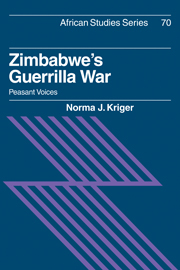Book contents
- Frontmatter
- Contents
- List of maps
- Acknowledgements
- Introduction
- 1 Peasant revolutions: theories and methods
- 2 Inequalities and peasant grievances
- 3 Strategies, goals and appeals: continuity and change
- 4 Guerrilla–civilian relations: the issue of popular support
- 5 Struggles in the struggle
- 6 Legacies of the war for peasants
- 7 Conclusion
- Appendix: Field research
- Notes
- Bibliography
- Index
- Other books in the series
1 - Peasant revolutions: theories and methods
Published online by Cambridge University Press: 05 January 2012
- Frontmatter
- Contents
- List of maps
- Acknowledgements
- Introduction
- 1 Peasant revolutions: theories and methods
- 2 Inequalities and peasant grievances
- 3 Strategies, goals and appeals: continuity and change
- 4 Guerrilla–civilian relations: the issue of popular support
- 5 Struggles in the struggle
- 6 Legacies of the war for peasants
- 7 Conclusion
- Appendix: Field research
- Notes
- Bibliography
- Index
- Other books in the series
Summary
This is a study of political mobilization and organization in a rural-based war of national liberation. The book addresses standard questions raised by those interested in political mobilization in nationalist or Marxist revolutionary guerrilla wars that take place in the countryside. How do guerrillas try to mobilize peasants' support and what accounts for their success or lack thereof? What are the peasants' motives for participating? What linkages, if any, are there between the mobilization process and post-war outcomes for peasants? The distinctiveness of this study derives from its attempt to answer these questions by relying on the direct voices of peasants and other active participants. Ironically, the direct voices of villagers are missing in most accounts of the revolutionary events in which they play so central a role. What peasants themselves have to say about their experiences in a revolutionary guerrilla war highlights what goes on at the village level and raises questions about the language of revolutionary elites, scholars, and others who write about peasants and revolutions.
Direct peasant voices are usually absent in studies of revolution regardless of the theoretical approach they adopt. Studies that are based on the premise that human agency determines revolutions – so-called voluntarist assumptions – might be expected to depend on what actors say and do. In fact, such studies generally infer evidence about peasant ideas from peasant behaviour that is itself inferred from non-peasant sources.
- Type
- Chapter
- Information
- Zimbabwe's Guerrilla WarPeasant Voices, pp. 5 - 50Publisher: Cambridge University PressPrint publication year: 1991

